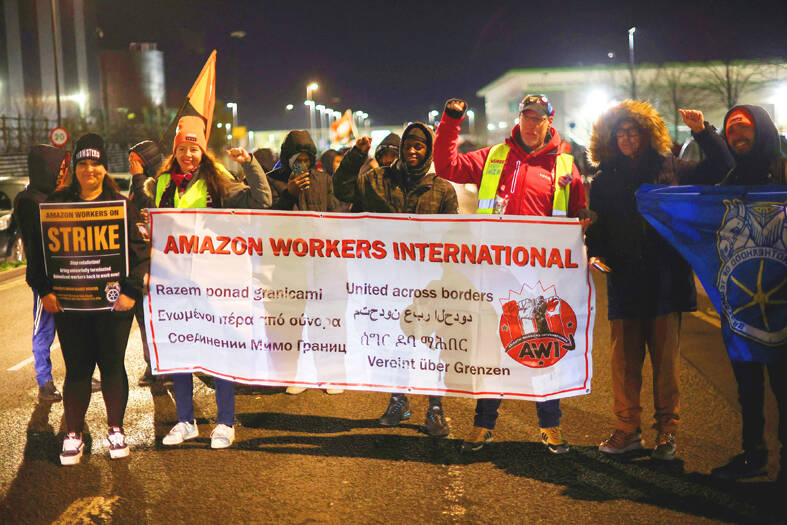Amazon.com Inc workers came out on strike at multiple locations across Europe yesterday as protests against the US e-commerce giant’s working practices picked up pace on one of the busiest shopping days of the year.
“Make Amazon Pay,” a global campaign coordinated by the UNI Global Union, said strikes and protests would take place in more than 30 countries from so-called “Black Friday” through Monday.
Many retailers slash prices to boost sales on Black Friday, the day after the US Thanksgiving holiday.

Photo: Reuters
Originally known for crowds lining up at big-box stores in the US, the event has increasingly moved online and gone global, fueled in part by Amazon, which advertises 10 days of holiday discounts this year from Friday last week to Monday next week.
In Germany, Amazon’s second-biggest market by sales last year, workers at five fulfillment centers in Bad Hersfeld, Dortmund, Koblenz, Leipzig and Rheinberg started a 24-hour strike at midnight on Thursday to demand a collective wage agreement, trade union Verdi said.
An Amazon spokesperson in Germany said workers are paid fair wages, with a starting salary of more than 14 euros (US$15.27) an hour, and have additional benefits. The spokesperson said deliveries of Black Friday orders would be reliable and timely.
More than 200 workers were striking yesterday at Amazon’s warehouse in Coventry, England as part of a long-running dispute over pay.
Nick Henderson, a worker at the Coventry warehouse, which acts as a logistics hub for Amazon to process products to send to other warehouses, said he was striking for higher pay and better working conditions.
The striking workers were chanting their demand for a pay rise to £15 (US$18.69) an hour.
An Amazon UK spokesperson said minimum starting pay is between £11.80 and £13 an hour depending on location, and would increase to £12.30 to £13 an hour from April next year. Amazon said the strike would not cause disruption.
Italian trade union CGIL called for a Black Friday strike at the Castel San Giovanni warehouse, while Spanish union CCOO called for Amazon warehouse and delivery workers to stage a one-hour strike on each shift on “Cyber Monday,” the last day of Amazon’s 10-day sale.
Amazon’s parcel lockers — located in train stations, supermarket car parks and street corners, and used by many customers to receive orders — are also being targeted.
In France, anti-globalization organization Attac is encouraging activists to plaster them with posters and ticker tape, potentially blocking delivery workers and customers from being able to open them.
Attac, which calls Black Friday a “celebration of overproduction and overconsumption,” said it expects the protest to be wider than last year, when it estimates 100 Amazon lockers across France were targeted.
Amazon has remained popular in Europe even as rivals such as Shein and Temu have seen rapid growth. Amazon’s app had 146 million active users in Europe last month, compared to 64 million for Shein and 51 million for Temu, data.ai’s data shows.

When an apartment comes up for rent in Germany’s big cities, hundreds of prospective tenants often queue down the street to view it, but the acute shortage of affordable housing is getting scant attention ahead of today’s snap general election. “Housing is one of the main problems for people, but nobody talks about it, nobody takes it seriously,” said Andreas Ibel, president of Build Europe, an association representing housing developers. Migration and the sluggish economy top the list of voters’ concerns, but analysts say housing policy fails to break through as returns on investment take time to register, making the

‘SILVER LINING’: Although the news caused TSMC to fall on the local market, an analyst said that as tariffs are not set to go into effect until April, there is still time for negotiations US President Donald Trump on Tuesday said that he would likely impose tariffs on semiconductor, automobile and pharmaceutical imports of about 25 percent, with an announcement coming as soon as April 2 in a move that would represent a dramatic widening of the US leader’s trade war. “I probably will tell you that on April 2, but it’ll be in the neighborhood of 25 percent,” Trump told reporters at his Mar-a-Lago club when asked about his plan for auto tariffs. Asked about similar levies on pharmaceutical drugs and semiconductors, the president said that “it’ll be 25 percent and higher, and it’ll

CHIP BOOM: Revenue for the semiconductor industry is set to reach US$1 trillion by 2032, opening up opportunities for the chip pacakging and testing company, it said ASE Technology Holding Co (日月光投控), the world’s largest provider of outsourced semiconductor assembly and test (OSAT) services, yesterday launched a new advanced manufacturing facility in Penang, Malaysia, aiming to meet growing demand for emerging technologies such as generative artificial intelligence (AI) applications. The US$300 million facility is a critical step in expanding ASE’s global footprint, offering an alternative for customers from the US, Europe, Japan, South Korea and China to assemble and test chips outside of Taiwan amid efforts to diversify supply chains. The plant, the company’s fifth in Malaysia, is part of a strategic expansion plan that would more than triple

Taiwanese artificial intelligence (AI) server makers are expected to make major investments in Texas in May after US President Donald Trump’s first 100 days in office and amid his rising tariff threats, Taiwan Electrical and Electronic Manufacturers’ Association (TEEMA, 台灣電子電機公會) chairman Richard Lee (李詩欽) said yesterday. The association led a delegation of seven AI server manufacturers to Washington, as well as the US states of California, Texas and New Mexico, to discuss land and tax issues, as Taiwanese firms speed up their production plans in the US with many of them seeing Texas as their top option for investment, Lee said. The